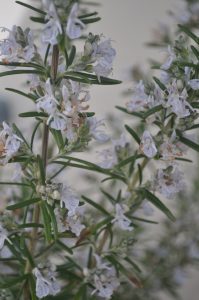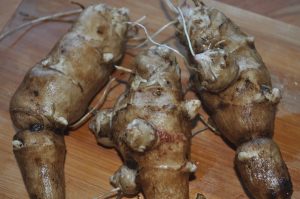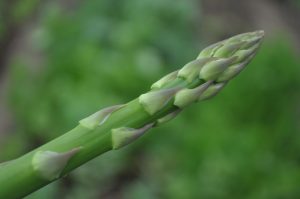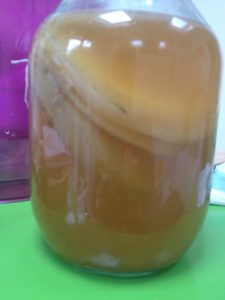Kim Stoddart offers 2018 growing ideas to help beat the January blues
Traditionally a time of year for looking ahead and detoxing after the excesses of the festive season, why not consider giving your veg patch a health makeover this year as well? Of course, home grown fruit and vegetables are good for you in themselves but there are some with extra immune-system-boosting properties that particularly help one shine.
Here’s a look at just some of the best, the thought of which is guaranteed to bring some rosy-cheeked-warmth to your day in the dark midsts of winter!
Natural anti-inflammatories
Garlic
As well as helping to keep vampires (and inflammation) at bay, this humble bulb contains allicin which provides it with many more health-giving-properties besides. Although scientific evidence is mixed; it has been claimed (and seen to have) a positive impact on lowering blood pressure and cholesterol and in providing protection (probably) against bowel and stomach cancers. Certainly eating a lot of garlic isn’t going to do your health any harm and I swear by eating it raw if I want to fight off a cold that I can feel loitering.
This incredibly easy-to-grow bulb is worth its weight in veg patch gold. Plant in spring for an early autumn harvest.
Ginger
Not so straightforward to grow as garlic, but top of the pile when it comes to proven anti-inflammatory properties. It is possible to propagate your own supply using supermarket leftovers. Just choose a healthy-looking piece with a bump (or eye) and plant it in seed compost in a small pot. Place it in a warm sunny spot and cover with plastic to help it on its way.
They may not be sexy or new but these Mediterranean herb patch stalwarts contain carnosic acid and carnosol which enable them to really punch above their weight in terms of beneficial anti-inflammatory properties. If you have some growing already then I’d seriously consider taking some cuttings in the summer and establishing more. Otherwise, they are easy to get started from either seed or small garden centre plants. Raised beds or pots in full sunshine are their preferred habitat and gritty soil a preference as being Mediterranean in origin they really don’t like having wet, soggy roots. Who can blame them?
Prebiotic foods and why they matter
The importance of healthy gut bacteria is increasingly being researched and has been linked directly to the strength of our immune systems and (some believe) our health overall. Whilst a lot of us are aware of probiotic supplements and foods (live yoghurt, fermented veg and so forth) which are supposed to provide our bodies with good bacteria, not so many people realise that in order to keep these good bacteria thriving, and bad bacteria at bay, prebiotic foods are recommended. These include:
This hardy tuber is incredibly easy to grow and has a lovely, almost nutty flavour with a hint of mushroom that is delicious roasted or added to warming winter dishes such as soups or casseroles. It’s known for its sometime wind-inducing properties which it just so happens is because of its excellent prebiotic properties. So if it makes you fart this is because it’s helping to feed the good bacteria in your gut, which is a good thing, honestly.
Plant tubers in fertile soil in a sunny spot in spring for a harvest after the first frosts in November or December. Do bear in mind the foliage grows tall so it’s best to plant where it won’t overshadow its neighbours. Some people like to use it as a windbreak for their plot, which I believe is incredibly apt.
As well as being one of my all-time home-grown favourites, these delectable spears just so happen to be fantastically good at helping to nurture your supply of good bacteria and keeping your system in balance as a result.
Easiest to grow from year-old crowns because you don’t have to wait so long till your first harvest, an asparagus patch once established can keep fruiting for up to 20 years so. It’s an investment that keeps giving.
Just keep the area around (and in-between) your plants weed-free and feed with manure (and if possible, seaweed) each season and your patch will do the rest.
Other vegetables
Garlic is also especially prebiotic as are leeks, onions, apples and yacon.
More unusual growing projects
Fermented probiotic tea made from a Kombucha culture has been claimed to help with everything from arthritis, gout and depression, through to diabetes, multiple sclerosis and cancer. Whether that is true or not, its immune-system-boosting properties and the fact that Samurai warriors used it to give them energy during battle, make this seriously worth a look!
The ‘tea’ comes from a liquid produced by the Kombucha culture which is a rather odd, slightly jellyfish-looking fungus that is kept in a container and fed with green tea and sugar.
You can buy a good range of starter kits and equipment from www.happykombucha.co.uk.
Chinese mushrooms
Mushrooms are used in Chinese medicine for a good reason and in particular strong immune system boosting claims have been made about Reishi, Maitake, Shiitake and Lion’s Mane.
To begin with it’s best to start with one of the many growing kits available to help you on your merry fungi-growing way.
A version of this article first appeared in my monthly SMART growing column for the fabulous Grow Your Own magazine




